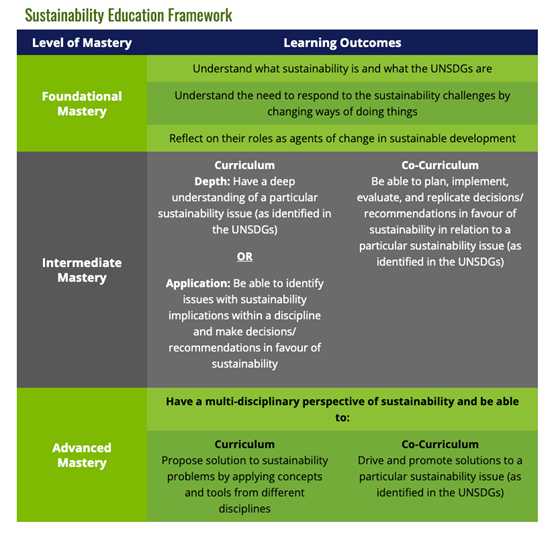
- SMU launches a new Master of Sustainability and a Second Major in Sustainable Societies to develop sustainability leaders and meet the needs of the green economy
- All incoming undergraduates will have to complete at least one sustainability course as a graduation requirement effective Academic Year 2024.
Singapore, 20 September 2023 (Wednesday) – Singapore Management University (SMU) will launch a new Master of Sustainability (MST) (永续发展硕士课程) and a Second Major in Sustainable Societies (SSOC) (可持续社会第二主修) as part of a suite of sustainability courses and programmes to develop sustainability leaders and meet the needs of a green economy. The MST is jointly helmed by the School of Social Sciences (SOSS) and College of Integrative Studies (CIS), and SSOC is being offered by the School of Social Sciences as a second major available to all SMU undergraduates.
The launch event to be held on Friday 22 September is part of the SMU Sustainability Series 2023 which comprises a curation of sustainability-focused events to be held between July and October 2023, through which the University will engage with stakeholders and partners to further the discourse on sustainability and to showcase the key milestones it has achieved, as charted out in its Sustainability Blueprint.
Since announcing its Vision 2025, Singapore Management University has made meaningful impact through the University’s three priority areas of particular economic and social relevance to our nation and region – Digital Transformation, Sustainable Living and Growth in Asia. As part of its ‘Sustainable Living’ pillar, the University launched in September 2022 a Sustainability Blueprint that charts its actions forward in concerted ways across four key strategies: Cultivate a Greener University; Develop Change Agents thorough Sustainability Education; Drive Impactful Research and Foster Resilient Communities.
University-wide Sustainability Education Framework in place
SMU’s sustainability education framework offers opportunities for foundational, intermediate, and advanced mastery of sustainability issues. SMU is committed to equip learners across all age groups with the knowledge, skills, and mindsets through education, and nurture them to become leaders and change agents who are able to address sustainability issues and promote sustainability as active global citizens. It offers a myriad of sustainability related programmes and courses across its Schools and Continuing Education Units (SMU Academy and SMU Executive Development), and integrates sustainability into the curriculum and co-curriculum.
Foundational Mastery
Every undergraduate student from the intake cohort of Academic Year 2023 will have a foundational understanding of sustainability. This includes understanding what sustainability is, what the United Nations Sustainable Development Goals (UNSDGs) are, and the need to respond to sustainability challenges by changing ways of doing things. They will also have the opportunity to apply their understanding of sustainability through co-curricular activities, including community service.
Intermediate Mastery
Intermediate mastery involves developing a deep understanding of a particular sustainability issue (as identified in the UNSDGs); or identifying issues with sustainability implications within a discipline and making decisions/ recommendations in favour of sustainability. Undergraduate students joining SMU from Academic Year 2024 must complete at least one course out of a set of curated sustainability courses that fulfils the intermediate criteria. These courses include Introduction to Sustainability Law, Sustainable Ocean Law and Governance, Digital Technologies for Environmental Sustainability and Psychology of Sustainability and we are continuing to expand our range of sustainability-focus courses.
Advance Mastery
Advanced mastery involves developing a multidisciplinary perspective of sustainability and being able to propose solutions to sustainability problems by applying concepts and tools from different disciplines. This can be achieved through a major in Sustainability. SMU now offers two second majors in Sustainability – Sustainability Management by the Lee Kong Chian School of Business, and the newly introduced Sustainable Societies by the School of Social Sciences.
Overall, the focus on sustainability in the undergraduate curriculum and co-curriculum, and the integration across the two areas, is designed to have transformational impact on knowledge, attitudes and behaviours.
More details can be found here.
New Master of Sustainability and a second major in Sustainable Societies
Inspired by the UNSDGs, the new Master of Sustainability and Second Major in Sustainability Societies aim to inspire an appreciation and sense of urgency about the complexities, trade-offs, and synergies that sustainability presents for the people and the planet that we inhabit.
Master of Sustainability (MST) by the College of Integrative Studies (CIS) and School of Social Sciences (SOSS)
Navigating complex sustainability challenges requires a multi-disciplinary approach. The MST is the first-of-its-kind programme that fuses expertise and leverages the research and pedagogical strengths of SOSS and CIS, with expertise of other schools at SMU, to offer a unique curriculum adept at meeting evolving professional and employer needs. The interdisciplinary programme will inculcate crucial skills in the areas of sustainability reporting, systems thinking and collaborative governance, in recognition of the evolving nature of sustainability roles across sectors.
Aligned with the United Nations Sustainable Development Goals (UN SDGs), the MST offers a holistic education centred on global sustainability priorities and best practices. Students will be required to take seven core courses, following which they can choose electives to develop a broad perspective on sustainability or, they may choose to embark on specialised tracks in either "Sustainable Resource Management", "Urban Systems Management", or "Environment and Sustainable Development" that will streamline skillsets that are prevalent in these sectors .
Based on a study and questionnaire commissioned by SMU in 2022 targeted at prospective students and employers, there was a strong interest and demand for an interdisciplinary Masters programme in sustainability at SMU. In addition, employers were given brief descriptions of the main curriculum themes and asked to indicate their feedback and support for the proposed topics and content and majority found the offerings to be highly important to their respective organisations and accorded high importance for their hires to be trained in interdisciplinarity of sustainability.
The MST caters to both full-time and part-time students and it will be offered from August 2024. Applications for the MST begins on 20 September 2023.
More information is available here.
Ishani Mukherjee, Associate Professor of Public Policy; Programme Director, Master of Sustainability and Sustainable Societies Second Major, SMU said, “Our sustainability curriculum is inspired by frameworks such as the United Nations Sustainable Development Goals and the Singapore Green Plan 2030. We want to equip our students with problem-solving perspectives and capabilities that mirror the environmental, social and governance realities and challenges of today, and the future. SMU’s Master of Sustainability equips students with the skills and knowledge needed to navigate new and evolving careers within a rapidly changing sustainability landscape.”
Orlando Woods, Associate Professor of Geography; Associate Dean (Research and Postgraduate Programmes); Interim Director, Institute for Urban Transformation in Asia and Lee Kong Chian Fellow, SMU said, “The opportunities and challenges created by sustainability agendas are, by their very definition, complex, dynamic, and cannot be adequately addressed through one disciplinary perspective alone. SMU’s Master of Sustainability is a first-of-its-kind programme that is managed by the College of Integrative Studies and School of Social Sciences. It draws on the breadth and depth of the SMU ecosystem to offer innovative, multi-disciplinary training for a new generation of sustainability professionals.”
Second Major in Sustainable Societies by the School of Social Sciences (SOSS)
The SMU Second Major in Sustainable Societies will be offered from Academic Year 2023, and it is intended to groom the next generation of green economy professionals who will make a difference and inspire others to contribute to an equal and sustainable world.
The Second Major in Sustainable Societies (SSOC) has three main pillars – environment, society and the economy – which mirror the realities and challenges of sustainable development of today and the future. Its three core modules - Sustainability and Society; Sustainability Reasoning and Analysis; and the Sustainability Practicum (SMU-X course) – will develop key competencies and an aptitude for analytical reasoning about sustainability across different industries and different stakeholders (government, corporates, civil society, NGOs). Through a problem-solving approach, students will learn to engage in depth with major issues in sustainability, understand current trends, and grapple with real-world trade-offs. Students will focus on the human dimensions of what it will take to address the world’s climate challenges through courses highlighting how sustainability and climate concerns intersect with inequality, poverty, gender, as well the food, water, and energy systems essential to human life. Students can choose to further specialise in interdisciplinary topics through their choice of electives.
The SSOC second major will feature the option of a Work Study elective, which is a six-month work placement to be undertaken concurrently with the student’s coursework. The internship placements under the Work Study Elective will include social enterprises that are supported by the DBS Foundation as well as positions with the National Environmental Agency and other private sector partners. The partnership with the DBS Foundation includes an array of activities that will embed real world problems and industry-relevant coursework across the curriculum.
Designed in consultation with industry stakeholders across both the public and private sectors, including those in key leadership and CSO roles, the second major covers knowledge and competencies that employers now seek in entry-level candidates who are interested in joining the sustainability practice.
Graduates with a strong background in sustainability will have ample opportunity to make their contribution through work and service. They can look forward to employment in industries such as consulting, audit and risk assurance, manufacturing, ESG and supply chain services and the public sector.
All SMU undergraduates can opt to take this second major by the end of their second year of study.
More information on SOSS’ majors is available here.
Chandran Kukathas, Dean, School of Social Sciences and Lee Kong Chian Chair Professor of Political Sciences, SMU said, “The future is in the green economy. The Sustainable Societies major’s three main pillars – environment, society and the economy – mirror the realities and challenges of sustainable development of today and the future. With emphasis on problem-solving perspectives and capabilities, and interdisciplinarity, this second major hopes to develop in students the skillsets for future green jobs across industries and sectors.”
